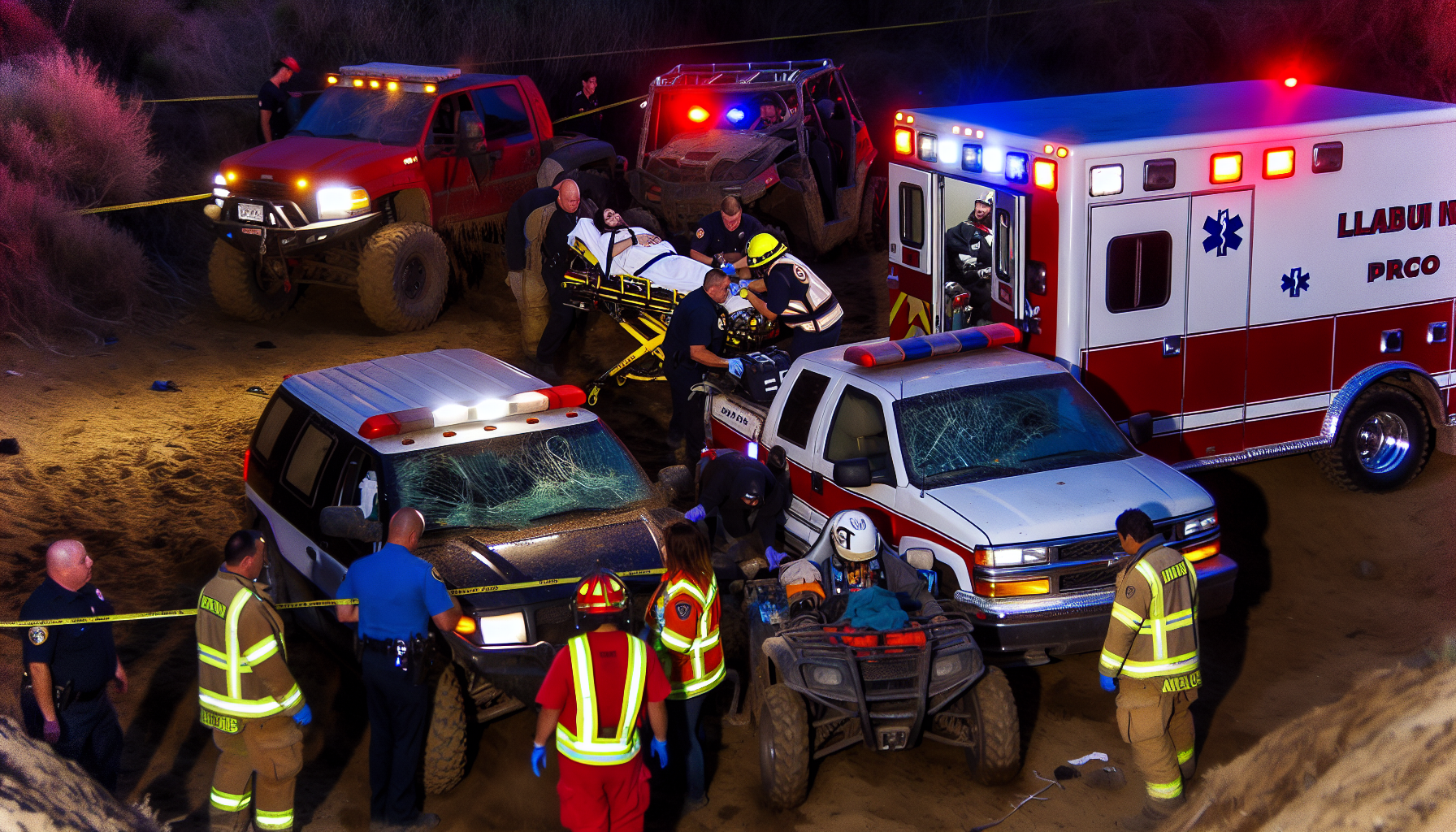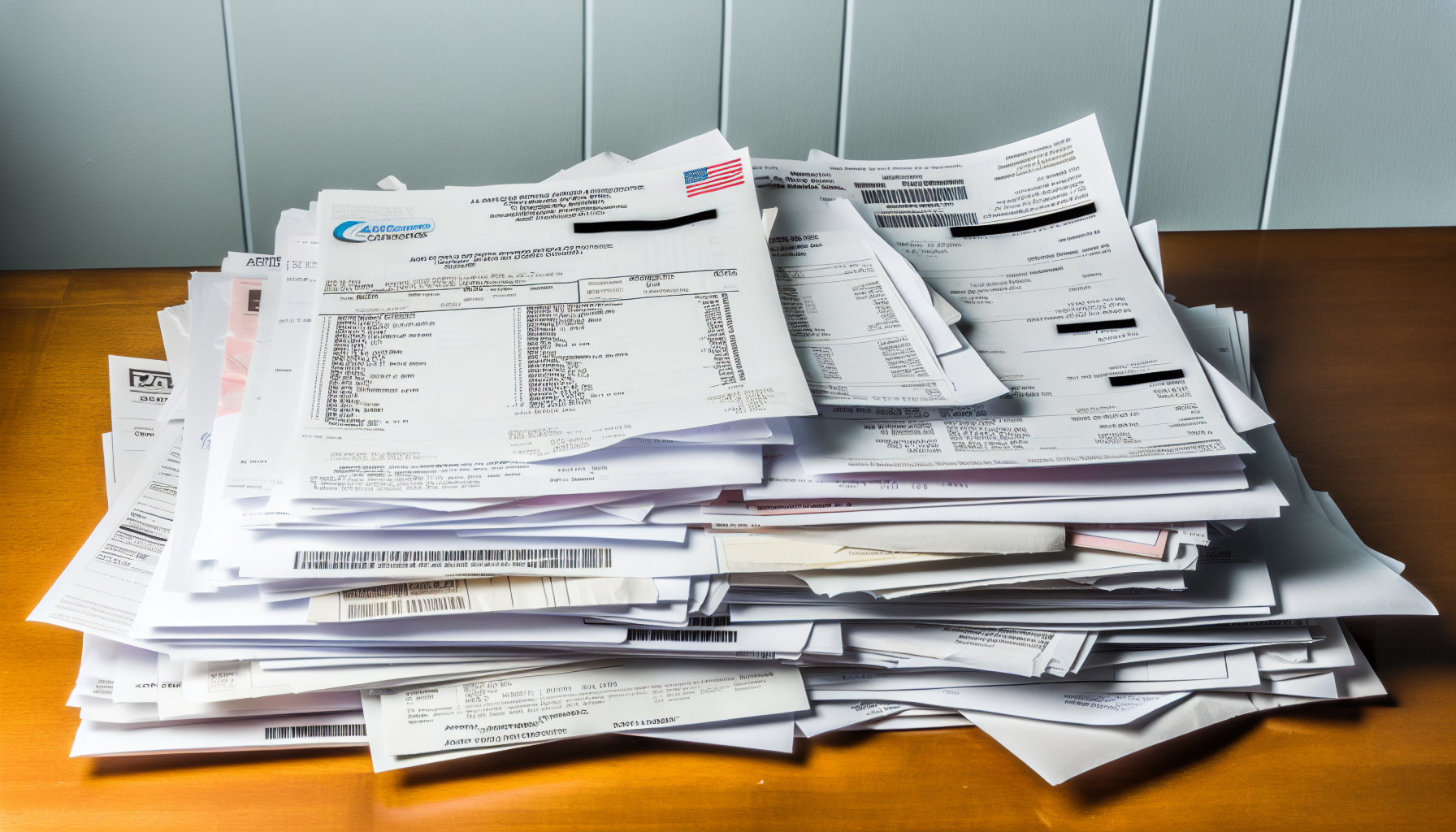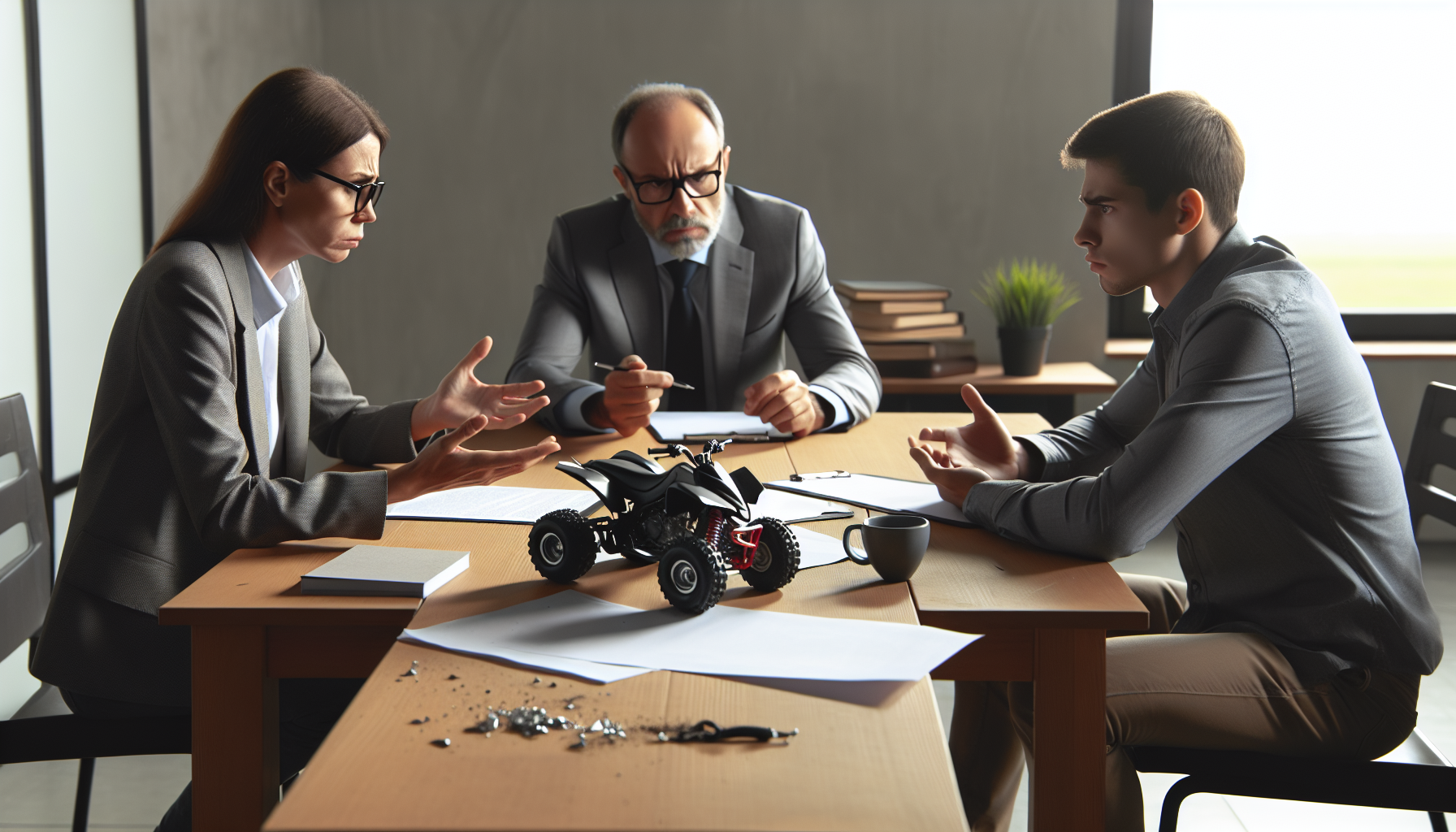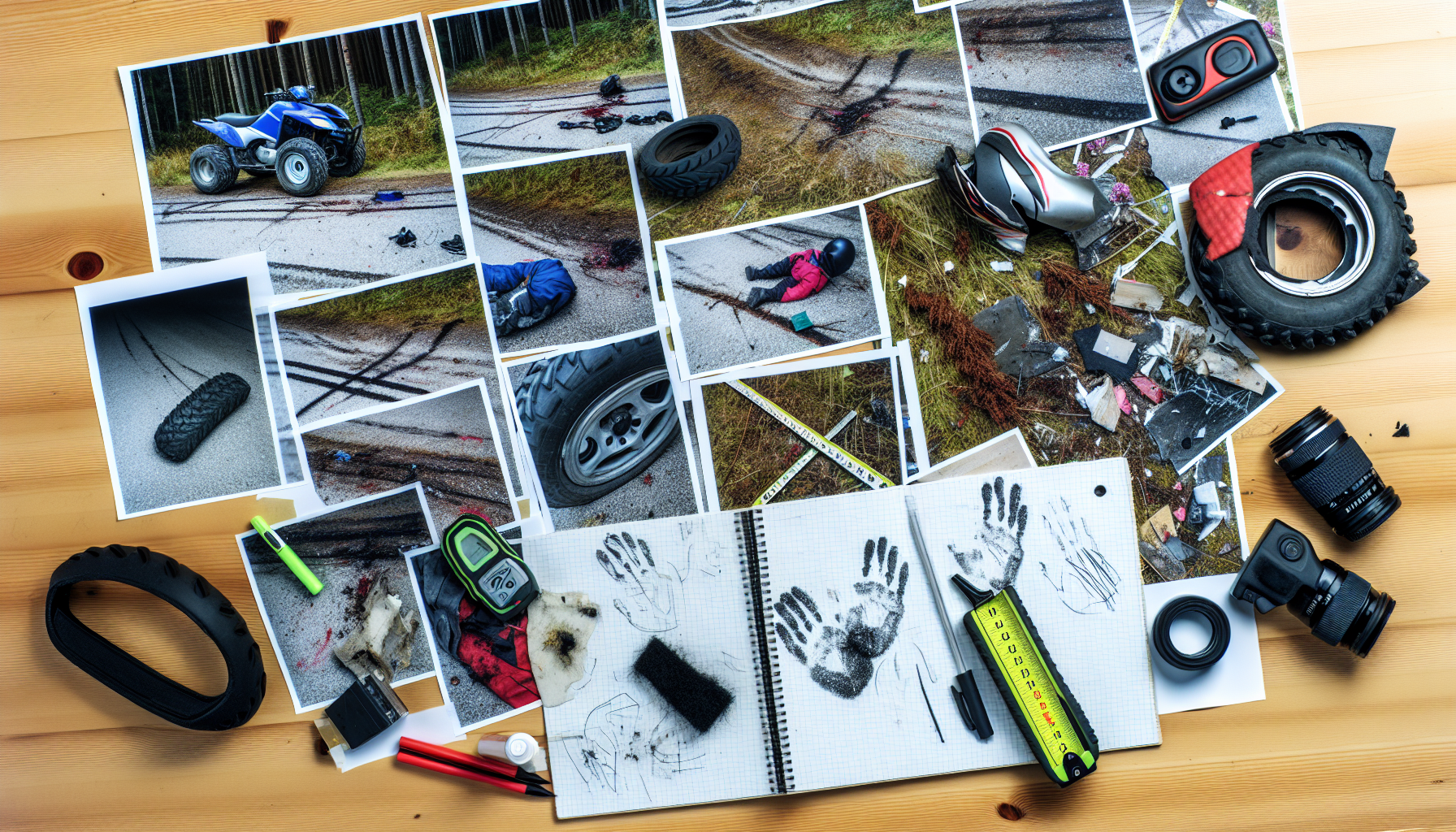Imagine cruising through the scenic trails of Georgia on your all-terrain vehicle (ATV), enjoying the rush of adrenaline and the feeling of freedom. This thrilling adventure, however, can take a sudden turn if you find yourself involved in an ATV accident. Accidents are never planned, but knowing what steps to take if you’re involved in one can make a world of difference. This guide is designed to help you navigate “what to do after an ATV accident in Georgia”, ensuring your safety, protecting your rights, and guiding you towards a successful recovery.
Key Takeaways
- Ensure your immediate safety, assess for any injuries and contact emergency services following an ATV accident.
- Consult an ATV accident lawyer, understand the statute of limitations, and take legal steps with the proper authorities and insurance companies.
- Document injuries, medical expenses and lost wages for recovery claims, and preserve evidence and witness accounts for a stronger legal case.
Immediate Measures Following an ATV Crash

The moments following an ATV accident can be overwhelming and confusing. However, understanding the steps to take immediately after the accident is crucial for ensuring safety and documenting the incident correctly.
Secure the Accident Scene
Just as in any other accident, securing the scene is the first step. Turn off the engine of your ATV, move away from the wreckage if possible, and alert other ATV riders to the hazard. This action helps to prevent additional injuries and maintains the accident scene for further investigation.
Assess and Document Injuries
After ensuring the safety of the scene, promptly assess any injuries sustained. If you or anyone else has a serious injury, call 911 immediately. Even if the injuries appear minor, it is still important to get medical care since certain injuries may not present symptoms right after the accident.
Don’t forget to document your personal injury with photographs and detailed descriptions, as these will be vital for any future legal claims, especially if protective gear was involved.
Contact Emergency Services
Once the injuries have been assessed, contact emergency services to report the accident. They will provide the necessary medical assistance and initiate an official accident report. When making the call, be sure to provide your location and a detailed description of the incident.
Navigating Legal Steps Post-Accident

Once the immediate actions have been addressed, the next course of action involves understanding the legal procedures that follow. This can be a daunting process, but with the right guidance, you can ensure that your rights are protected.
Reporting the Accident
Reporting the accident is the first legal step you should take. This helps to formally record the incident and related details, which can be useful for potential future claims, particularly in cases involving serious injuries.
Here’s what you need to do:
- Contact the local law enforcement agency or the Georgia Department of Natural Resources (DNR).
- Provide all necessary details about the accident.
- Be sure to get a copy of the official accident report.
Consult an ATV Accident Lawyer
Next, consider consulting an ATV accident lawyer. They can assess your claim and guide you through the legal complexities that may arise after an ATV accident.
An expert ATV accident attorney can help explore avenues for seeking compensation when an ATV accident occurs, addressing any ATV injuries and damages incurred as a result of the accident, including those sustained by ATV accident victims who were injured in an ATV. Understanding the common causes of ATV accidents and being aware of atv manufacturers’ safety guidelines can help prevent future incidents and ensure a safer riding experience for all, while minimizing the risk of atv related injuries.
Understanding Statute of Limitations
Lastly, it’s crucial to understand the statute of limitations for filing a claim involving Georgia ATV accidents. Generally, you have two years from the date of the ATV accident to file a claim, especially in cases involving severe injuries. However, there are certain exceptions, like ‘The Rule of Discovery’, which can extend this deadline based on when the injury was discovered.
Managing Medical and Financial Recovery

Apart from dealing with the immediate consequences, the path to medical and financial recovery is a long-term journey that necessitates careful planning and record-keeping.
Seeking Immediate Medical Attention
Regardless of how you feel after the accident, it is imperative to get medical attention immediately. Some injuries, including spinal cord injuries, may not manifest symptoms right away, and early intervention can significantly improve your recovery process.
Keeping Track of Medical Expenses
It is important to maintain a record of all medical expenses incurred as a result of the accident. This includes, but is not limited to:
- hospital bills
- doctor’s fees
- medication costs
- rehabilitation expenses
Having a detailed record of these expenses will be invaluable when it comes to filing a claim.
Handling Lost Wages and Earning Capacity
If your injuries prevent you from working, you’ll need to document your lost wages and potential earning capacity. This includes gathering pay stubs, employer statements, and calculating potential future earnings impacted by the accident.
Dealing with Insurance Companies

Navigating interactions with insurance companies can be intricate. However, understanding how to handle this can greatly help in securing the compensation you deserve.
Filing an Insurance Claim
Start by filing an insurance claim with your provider or the at-fault party’s insurer. Be sure to detail the accident and your injuries accurately and comprehensively, as this will be crucial in determining the compensation you receive.
Understanding Your Coverage
Comprehending the extent of your insurance coverage is key to receiving the right amount of compensation. ATV insurance, designed for all terrain vehicles, typically includes liability coverage for injuries to others and damage to other people’s property, so be sure to review your policy carefully.
Negotiating with Insurers
Lastly, don’t be afraid to negotiate with the insurance company. They may try to offer a settlement that is lower than what you deserve, but with the help of your lawyer, you can secure a fair settlement.
Preserving Evidence and Witness Accounts

Maintaining evidence and witness testimonies is instrumental in constructing a robust legal case. This includes collecting physical evidence, obtaining witness information, and securing expert testimonies.
Collecting Physical Evidence
Physical evidence can include photographs of the accident scene, damaged clothing, and any accessories worn at the time of the accident. This evidence can be invaluable in establishing what happened and who was at fault.
Witness Information
Witnesses can provide a third-party perspective of the accident, which can be extremely valuable in your case. Make sure to obtain their contact information and statements regarding what they saw.
Expert Testimonies
Expert testimonies from medical professionals, accident reconstruction specialists, and other experts can provide additional insight into the accident’s circumstances and your injuries. This can significantly strengthen your case.
Long-Term Considerations After an ATV Accident
The recovery process post an ATV accident includes:
- Immediate actions and legal procedures
- Rehabilitation and therapy
- Home and lifestyle adjustments
- Psychological impact of the accident
These are all important considerations to take into account.
Rehabilitation and Therapy
Participating in rehabilitation and therapeutic activities is crucial for physical recovery following an ATV accident. Therapies such as physical therapy, occupational therapy, and speech therapy can help you regain strength and independence in your daily activities.
Home and Lifestyle Adjustments
Depending on the severity of your injuries, you may need to make adjustments to your home and lifestyle. These can range from minor changes like installing handrails to major modifications like wheelchair ramps.
Psychological Impact and Support
Finally, don’t neglect the psychological impact of the accident, including potential traumatic brain injuries. Seek support from mental health professionals, support groups, and loved ones to help you cope with any emotional distress or trauma resulting from the traumatic brain injury.
Summary
In conclusion, while the aftermath of an ATV accident can be overwhelming, knowing the essential steps to take can greatly assist in your recovery. From securing the accident scene and seeking immediate medical attention to consulting an ATV accident lawyer and dealing with insurance companies, each step is crucial in ensuring your safety, protecting your rights, and guiding you towards a successful recovery. Remember, your health and wellbeing are paramount, so don’t hesitate to seek help and take the necessary measures to protect your interests.
Frequently Asked Questions
Which of the following must you do if you are involved in an accident?
If you are involved in an accident, the first thing to do is check for injuries and seek medical attention if necessary. You should also call 911 to report the accident and exchange information with the other parties involved.
What is the leading cause of injury and fatal accidents in the ATV?
The leading cause of injury and fatal accidents in ATVs is operating them on paved surfaces, riding double, riding without adult supervision, and inexperienced operators riding alone. Stay safe and follow the recommended guidelines for ATV operation.
What does ATV mean in an accident?
ATV in an accident stands for All-Terrain Vehicle. It refers to any incident or collision involving an All-Terrain Vehicle that results in property damage, personal injury, or loss of life.
What type of injury accounts for the most ATV deaths?
Head trauma is the most common type of injury that accounts for the most ATV deaths, followed by extremity trauma. This presents a significant risk of morbidity and mortality for individuals involved in ATV accidents.
What should I do immediately after an ATV accident?
After ensuring your safety, it's crucial to secure the accident scene, assess and document any injuries, and then contact emergency services. Taking these steps promptly is essential for handling the situation effectively and getting the necessary help.

